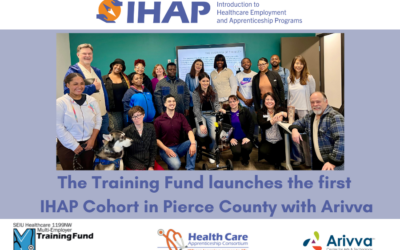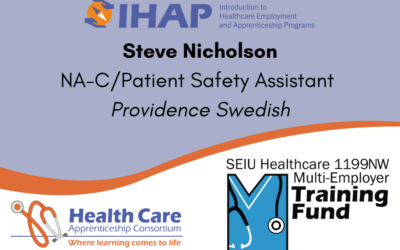Health Care Apprenticeship Consortium
a partnership created to provide all healthcare employers within Washington State access to the benefits of skilled apprenticeship training for their workforce.Stay up-to-date on healthcare apprenticeship opportunities!
Overview of Healthcare Apprenticeships
Join the Medical Assistant (MA), Central Sterile Processing Technician (CSPT), Pharmacy Technician (CPhT), Behavioral Health Tech, Peer Counselor, or Substance Use Disorder Professional Apprenticeship programs and receive the benefits of skilled apprenticeship training for your workforce!
These full-time, paid positions combine technical instruction with hands-on learning. Contact us to learn about upcoming cohorts.
Apprenticeships provide employers with a pathway of skilled workers, lower turnover for apprentices and mentors, skills that match your needs and culture, increased loyalty, and higher productivity. Employers can choose their apprentices, and remote learning options near or at your location are available.
- Pay & benefits: Apprentices are full-time, paid employees with benefits. Apprentices complete 2,000 hours of paid on-the-job training and 288 – 362 hours of technical instruction within 12 – 24 months.
- Certification: These programs prepare students to receive the MA-C, CRCST, CPhT or other related certification and work as a Medical Assistant, Sterile Processing Technician, Pharmacy Technician, or Behavioral Health staff in Washington State.
- Full-time job at clinics and hospitals throughout Washington: Apprentices work and learn in full-time positions (post-completion service commitment required).
Apprenticeship Program Standards
The Health Care Apprenticeship Consortium programs are all approved by the Washington State Apprenticeship and Training Council and registered with the Washington State Department Labor and Industries.
Apprenticeships work!
Jamari Bovan shares his excitement on passing the CCMA exam and what this means for his healthcare career as a Medical Assistant. Watch the video below.
Latest News
The Training Fund launches the first IHAP Cohort in Pierce County with Arivva
The Training Fund’s Introduction to Healthcare employment and Apprenticeship Program (IHAP) trains entry-level job seekers for healthcare careers. IHAP was developed by the Training Fund’s Health Care Apprenticeship Consortium (HCAC) and is implemented in partnership...
IHAP Spotlight: Steve Nicholson
After completing the Introduction to Healthcare employment and Apprenticeship Program (IHAP) program and Nursing Assistant-Certified (NA-C) training in about three months, Steve Nicholson is now an NA-C/Patient Safety Assistant at Providence Swedish. Steve’s...
Apprentice Spotlight: Arizona Kerker
Arizona Kerker is a recent high school graduate – and is already on her way to becoming a Pharmacy Technician with college credit! And that’s not all, she is the first apprentice of the Sno-Isle TECH Skills Center Pharmacy Technician Apprenticeship class and the first...
View all past news items
Details for Employers
Invest now for skilled workers in the next couple of years! The Health Care Apprenticeship Consortium helps you recruit and retain employees.
Benefits of Apprenticeship for Employers: increased retention for apprentices and mentors, pathway of skilled workers, better matching of skills with your needs and culture, increased bottom line, employee loyalty, and higher productivity.
Apprenticeships and Training Programs commonly attract qualified, local, diverse applicants at a 10 to 30:1 ratio to openings.
Tap into the wealth of diverse candidates that are already present in your community and want long-term positions: they just need training!
Return on investment: Data from the Seattle Jobs Initiative shows that in their first year, an academically trained Medical Assistant (MA) has the advantage over an apprentice. In the second year, the apprentice begins to pull ahead. By year three, an apprentice has a 57% ROI ($102,488 net-cost benefit) compared to 27% for the academically trained MA ($53,850 net-cost benefit).
Apprentices also provide value from the very beginning, because they see patients (i.e., generate revenue) as they progress through an apprenticeship.
How does it work? The Health Care Apprenticeship Consortium partners with you to create and implement an apprenticeship program. You only need one apprentice. Watch our implementation video below to learn more.
Apprenticeship Eligibility
- Applicants must be 18 or older, have a high school diploma or equivalent, and be able to perform the physical duties associated with the role.
- Prior to program entry, applicants must typically pass an assessment to enter upper pre-college Math (087/091) and English (094/098).
- Applicants are selected by individual employers who participate in the Health Care Apprenticeship Consortium. Most cohorts are open to general applicants. Current SEIU Healthcare 1199NW members are encouraged to apply.

Teri Lindsay
Medical Assistant, Kaiser Permanente
“This program will help bring a new perspective to the Medical Assistant field and will help grow the profession. It’s great to work with management to help people move forward in their healthcare career.”



